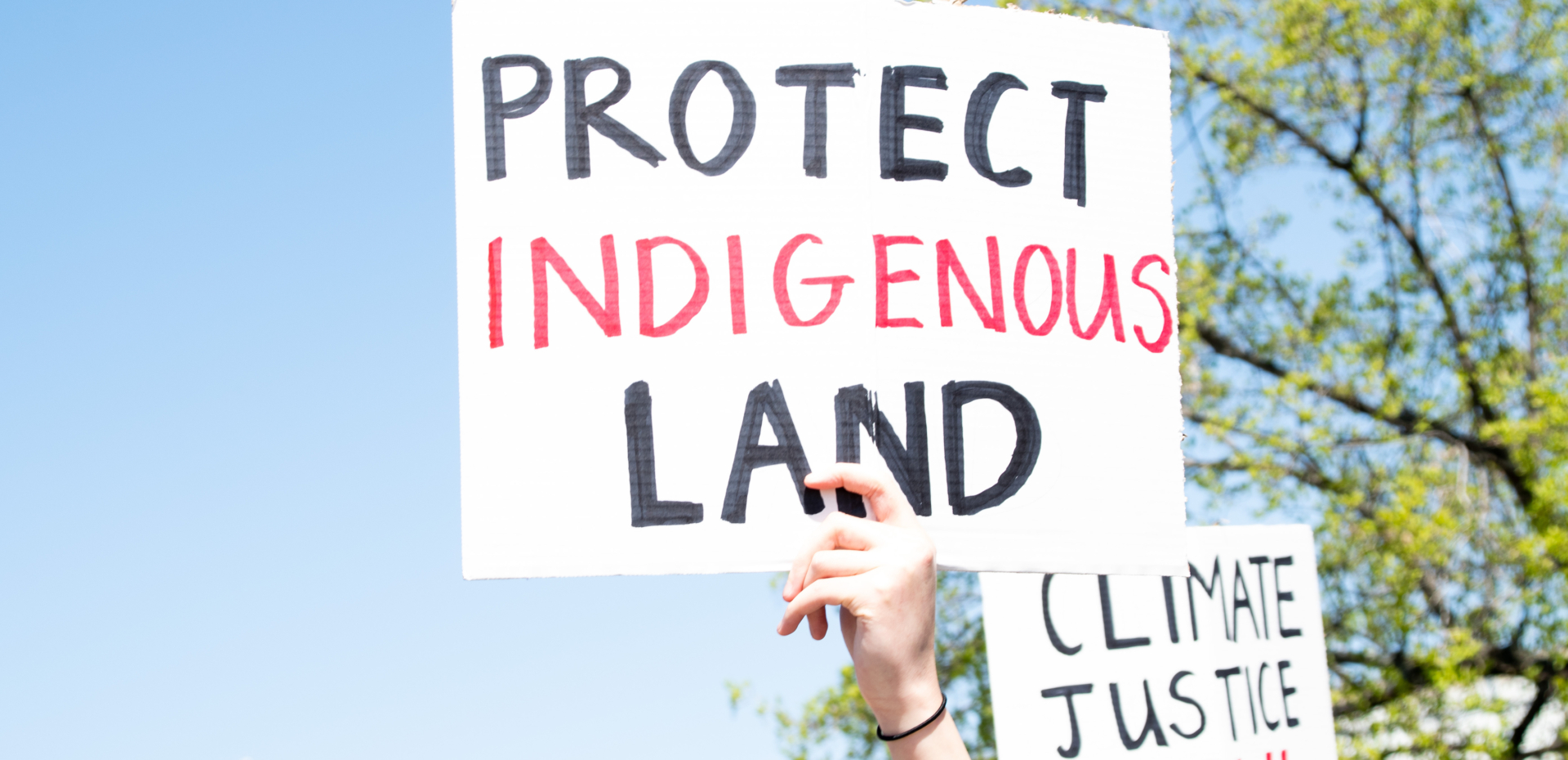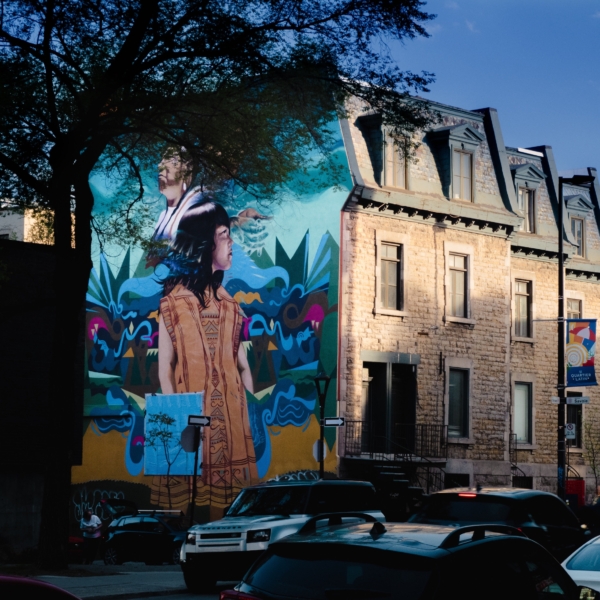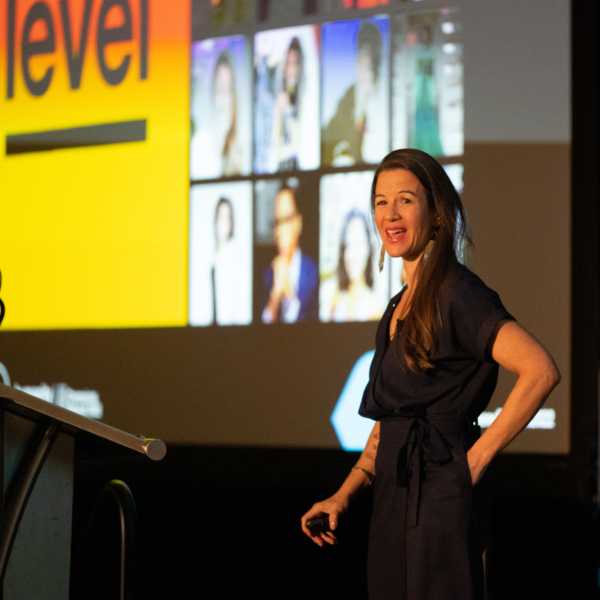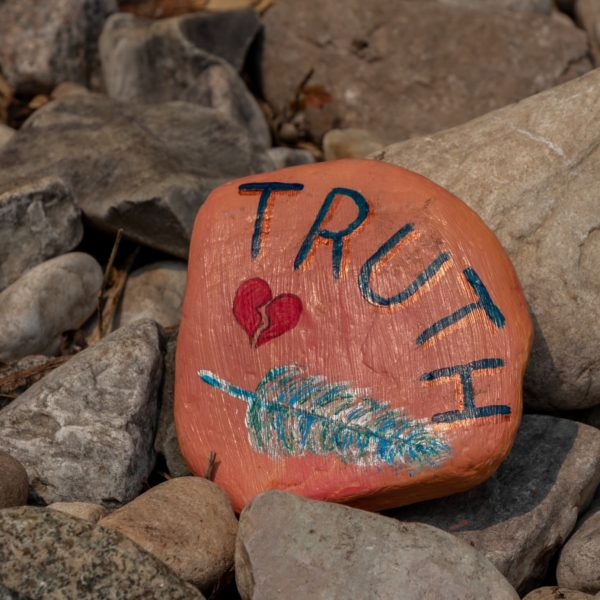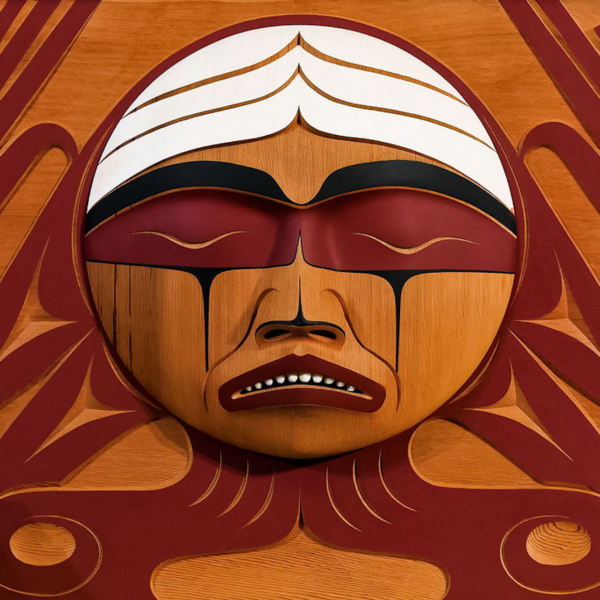Partnerships and Tools for Business Climate Justice and Reconciliation
October 25, 2023
Canadian B Corps and Partners Share Learnings for Social and Environmental Impact
Certified B Corporations in Canada use business partnerships, resources, and other pathways to advance climate justice and reconciliation. They shared examples and tips that other companies can use for inspiration during a recent half-day B Corp Leadership Development (BLD) online conference, building on a BLD event earlier this year.
The B Corp efforts contribute to the call to action for reconciliation with Indigenous peoples that the Canadian government adopted in 2021 and to progress toward racial equity and climate justice, which, with a stakeholder economy are the three pillars in B Lab U.S. & Canada’s Theory of Change. Guided by interdependence, B Corps are listening and learning from Indigenous peoples and other community leaders as they reconsider how business decisions and practices affect the Earth.
Misty Wade Hovey, Chief Marketing and Engagement Officer at B Corp EcoAdvisors, launched the BLD event by reiterating the urgency of addressing the climate crisis and partnering with the communities feeling its deepest effects. “Ultimately, the goal of climate justice is to create a more equitable and more sustainable future for all,” she said. “Nature is also a powerful catalyst for reconciliation.”
When reconsidering business decisions and actions, B Corps can seek examples from the reciprocal relationship that Indigenous communities have with the environment. “When the Earth thrives, Indigenous peoples and all people prosper,” Wade Hovey said.
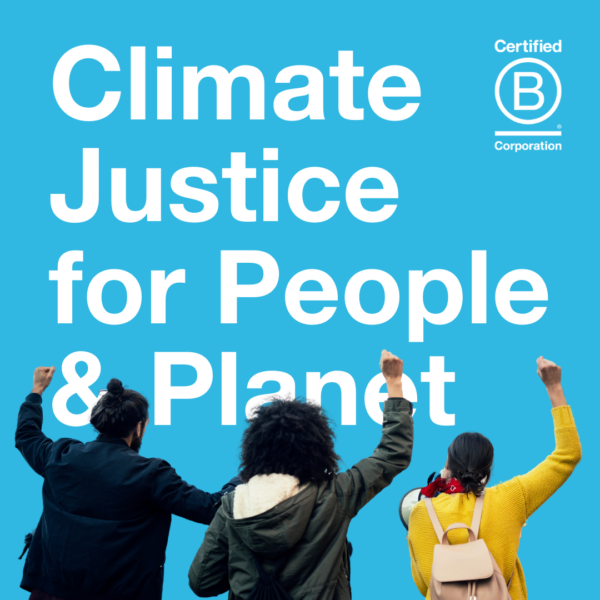
Climate Justice Toolkit
This free resource helps businesses engage in reflection, learning, and action around climate justice. The toolkit includes a Climate Justice Reflection Challenge, glossary, and calls to action.
An Introduction to Two Canadian B Corp Climate Justice Initiatives
Grace Mausser, Policy Manager at B Lab U.S. & Canada, helped introduce two new climate justice initiatives for Canadian B Corps. One is the B Corp Canadian Climate & Environmental Justice Policy Principles, co-created by a committee of Canadian B Corps. “Our focus is to think about how we, as B Corps, as a community of businesses striving to be sustainable in every sense of the word, can center justice as we seek to mitigate climate impact but create a more thriving environment for us to live in,” Mausser said. “It takes the lead from People of Color, Indigenous communities, low-income communities — from the people who are most impacted by climate change.”
To build on those principles, Mausser said B Lab U.S. & Canada is partnering for broader collective advocacy work with Ecojustice, Canada’s largest environmental law nonprofit. “We have realized just how much policymakers want to hear from businesses,” she said. “(But) policymakers in both the U.S. and Canada are hearing from businesses that are not concerned with creating a sustainable economy or climate justice. It’s impactful when they hear from people who do have those values. Using this business voice is really powerful.”
Tracy London of Ecojustice said the organization works with partners to protect the environment, fight climate change, and advocate for healthy communities for all people. “The principles you’ve set around climate justice align with our values and history as an organization,” she said. “We push for better laws, and we engage the public.”
That focus on the future includes climate justice cases that aim to protect the planet and the rights of younger generations. “We need to hold governments to account for the standards that they are meant to uphold to ensure that our youth have a survivable future,” London said. “As B Corps, you have an extraordinary voice and power.”
How to take action: Explore the B Corp Canadian Climate & Environmental Justice Policy Principles.
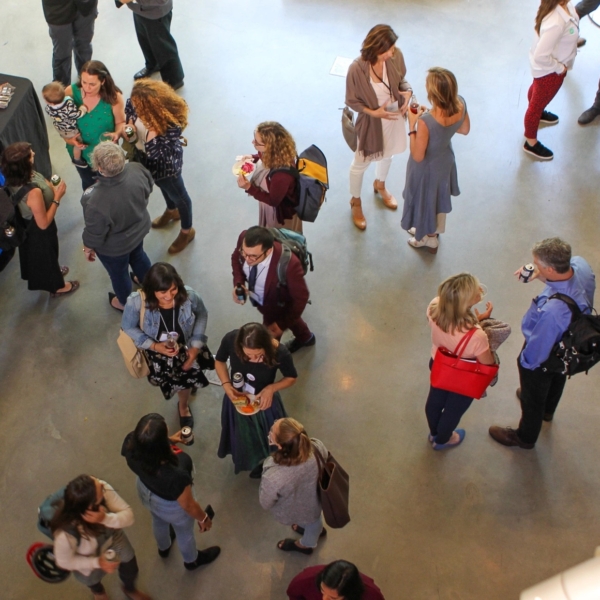
Engage Close to Home With Your B Local
Led by passionate volunteers, B Locals are just one of several networks that exist to create connections, increase the positive impact of their B Corp community, and raise awareness of the B Corp Movement.
A Partnership to Provide Clean Energy and Advance Reconciliation
A clean energy investment partnership launched in 2019 in northwest British Columbia serves as a climate justice and reconciliation model. Through the agreement, the Tahltan Nation purchased a percentage of three British Columbia hydroelectric facilities from Axium Infrastructure Canada and Manulife Financial Corporation. Bill Adsit, a member of the Tahltan Nation and Chair of the Tahltan Heritage Trust, said during the BLD conference that the partnership includes an impact benefit agreement that provides royalty payments and jobs for Tahltan Nation members — “the first step to self-sufficiency and financial independence.” Projects like the Tahltan Nations hydroelectric agreement have several benefits, he said, including helping to fulfill the UN Declaration on the Rights of Indigenous Peoples and producing energy with less environmental impact.
For other companies interested in partnerships with First Nations, Adsit said they first should check the First Nations interactive map to learn about Indigenous peoples in their area. The next step is starting a two-way conversation where First Nations members share their concerns about the environment or other issues that touch their lives. “Don’t go in and talk about the economic benefits they’re going to gain,” he said. “Realize there are always environmental issues. Look at those and seek ways to mitigate them. Once you talk about the environmental concerns, that puts everybody in a good starting place.”
Suzanne Leblanc, Senior Vice President of Responsible Investments for Axium Infrastructure, said communication and trust have been key components of the partnership with Tahltan Nation. “It’s important to really listen to challenges from all stakeholders,” she said. “Talking freely about them may bring to light some solutions. … We really benefited from the knowledge of the Tahltan Nation about some concerns regarding nature.”
How to take action: Build a foundation for reconciliation work with the free online Indigenous Canada course offered by the Faculty of Native Studies at the University of Alberta.
Regenerative Solutions for Reconciliation and More Resilient Rural Communities
Businesses and community are joining forces for the Rural Upper Fundy Partnership. Together, they explore regenerative solutions to sustain rural communities in New Brunswick’s Upper Bay of Fundy ecological zone. Canadian B Corp Wicked Ideas is guiding the project with help from fellow Canadian B Corp GreenStep, which provided an initial sustainability audit, and the Flourishing Business Canvas, a free online tool for impact-minded organizations and individuals worldwide.
Antony Upward originated the Flourishing Business Canvas about 10 years ago to help business leaders convey their company model and stakeholder impact in straightforward ways. Since then, people at B Corps and other organizations have helped evolve the canvas by sharing their experiences and lessons. By responding to 17 questions, users help the canvas create a description of a company’s business model, including social, environmental, and financial practices.
That description of the canvas’ integrated business model can help people better understand their organization’s stakeholders and how decisions affect them. “The canvas prompts you to think about the resources you take from the environment, whether yourself directly or through your supply chains,” Upward said. “It also asks you to think about what you’ve put back into the environment. … That opens people’s eyes to really thinking more deeply about the impact they’re having environmentally and start to think about solutions.”
The Rural Upper Fundy Partnership has used the canvas to envision what’s possible for the region, a coastal tourist destination facing climate threats, including hurricanes and biodiversity loss. It’s also home to rural communities with some infrastructure needs, said Lisa Hrabluk of Wicked Ideas.
“Our ability to receive visitors has always been a bit challenging and will only become more challenging as the climate crisis increases,” Hrabluk said. “The canvas allowed us to look into the future and consider what we want here in the Bay. Where do we want our land and people to be in 2045?” Through what Hrabluk calls the “gift of reverse engineering,” the canvas helped the partnership determine initial action steps to move in the desired direction.
How to take action: Explore the Flourishing Business Canvas for your company or organization.
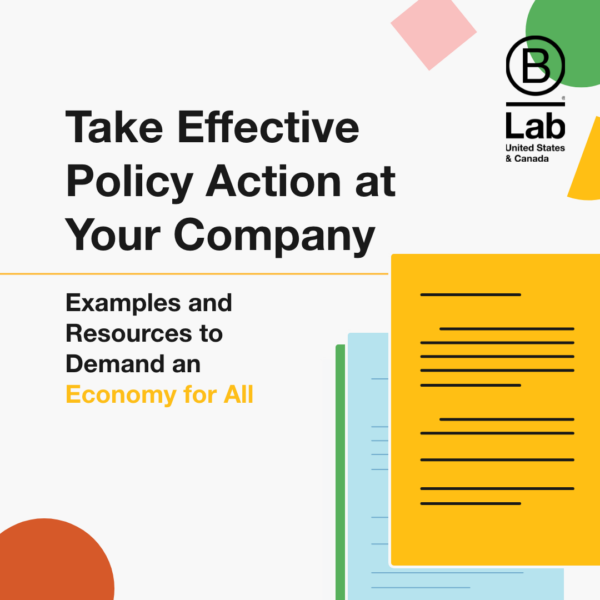
Take Effective Policy Action at Your Company
This free downloadable resource shares how B Lab U.S. & Canada and the B Corp community are building a stakeholder economy and driving collective political action to make the rules of the game more equitable and beneficial for all.
Business Pathways to Profit and Impact: Advancing Climate Justice and Reconciliation
Canadian B Corp leaders provided business examples that are forging pathways to profit and impact during a panel moderated by Julie Savaria of Bindia Savaria. They shared how they are collaborating within their companies and across their supply chains to restore ecosystems, shift business strategy, and embed climate justice and reconciliation in the core of their business.
Elisabeth de Gramont, Frank & Oak, said the company’s focus on climate justice has grown since its founding in 2012 in Montreal. “We have observed the idea of sustainability and the impact of fashion — on climate and the environment and the communities that make the clothes — became top of mind,” she said.
Frank & Oak discovered ways to address its social and environmental impacts through its global supply chain. “We spent a lot of time understanding the impact of the fabrics and materials we use and their impact on the environment,” de Gramont said. “We are trying to choose or seek alternatives and partners working on alternatives that are both innovative and give back to the communities producing them.”
This includes yak wool sweaters that use materials gathered by nomadic communities in Tibetan areas of China. Yak wool is a lower-impact material than cashmere, she said, because yaks have a smaller impact on grasslands and lower carbon emissions than goats. “It’s a great alternative to traditional sources and also giving back to the communities where the yarn is coming from.”
Andreea Iliescu of Earth Rated said responsibility is one of three company pillars, along with innovation and community. The B Corp was founded on a business model that incorporates the environment, as its dog waste bags and other products incorporate recycled materials. Earth Rated also prioritizes community by building stakeholder relationships and partnerships that help advance reconciliation, she said.
Earth Rated’s reconciliation work began in 2021 when the Canadian government formalized the National Day for Truth and Reconciliation. Earth Rated has partnered with Snap Quebec to support the organization’s work to protect Inuit sacred sites. Through an employee suggestion, Earth Rated workers also volunteer and provide other assistance to a Montreal-based day center for Indigenous peoples. “Building on existing relationships in a genuine way that allows people to learn something new,” she said. “Our employees are interested in learning (about reconciliation), as 30% of them identify as ethnic minority. It’s very important to have that education piece.”
Philippe Choinière, Oneka Elements, said care and well-being are inspirations for the Quebec-based cosmetics business. While the scale of climate justice issues can be overwhelming, Choinière said it was important to focus on establishing a profitable business and building impact from there. “No margin, no mission. If you don’t have a profitable business, forget sustainability,” he said. “I wish someone would’ve talked to us earlier about making a profit and to be able to have a focus so that we could have more impact.”
At Oneka Elements, using business as a force for good means reducing waste by offering product refills at more than 300 retail partners in North America. “It’s not us who save them, it’s the consumer,” he said. “We’re offering solutions.” The B Corp also supports Water First, which helps address water challenges in Indigenous communities through education, training, and collaborations.
For Danone Canada, a regional focus on climate justice and reconciliation aligns with the corporation’s historical focus on social responsibility. Pascal Lachance, Director of Sustainability at Danone Canada, said its mission to bring health through food to as many people as possible continues to guide community-based reconciliation efforts. “We don’t want to pretend that we’re experts. We are a business like many that have learned a lot and grown through this process,” Lachance said in a conversation with Thomas Raffy, Director of Marketing and Communications for fellow Canadian corporate B Corp Assomption Vie.
Through a new partnership with the Downie & Winjack Fund, Danone Canada is establishing a heritage room with educational resources on the story of Chanie Wenjack, a residential school student who died of starvation and exposure after running away from the school in an attempt to return to his family. Danone Canada is also launching a First Chance Employment Program designed to provide a pathway to careers for young adults from First Nations communities. A longer-term partnership with Breakfast Club of Canada includes product donations and employee engagement that support school nutrition programs in Indigenous communities.
Raffy of Assomption Vie said he sees climate justice as a lifelong learning journey. “Our goal with reconciliation was to make sure we were aligning our actions with the values of the company,” Raffy said. For the B Corp, that includes creating scholarships for First Nations students to support their path toward post-secondary education and careers. “It speaks to the importance of this effort to education and then action.”
Additional resources
- Guidance on Engagement with Indigenous Peoples, Local Communities and Affected Stakeholders
- Reconciliation Canada Toolkits
- Business Reconciliation in Canada Guide Book
- 4 Seasons of Reconciliation Course
- San’yas Anti-Racism Indigenous Cultural Safety Training
- Indigenous Corporate Training
- Native Land Global Map
- B Corp Climate Collective Climate Justice Resources
Sign Up for our B The Change Newsletter
Read stories on the B Corp Movement and people using business as a force for good. The B The Change Newsletter is sent weekly.
